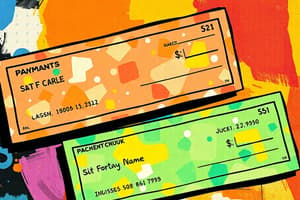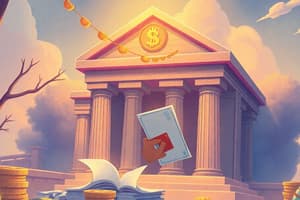Podcast
Questions and Answers
What is a potential disadvantage of using a debit card?
What is a potential disadvantage of using a debit card?
- It requires physical transactions only.
- There is a risk of loss or theft.
- Cash withdrawals are not allowed.
- Overspending can result in costs. (correct)
What is an advantage of using cash as a payment method?
What is an advantage of using cash as a payment method?
- It can be used for large items effectively.
- It promotes easy control of expenditure. (correct)
- It is the most secure method of payment.
- It allows for online transactions.
Which payment method is noted for potentially encouraging overspending?
Which payment method is noted for potentially encouraging overspending?
- Cash
- Credit card (correct)
- Electronic transfer
- Cheque
What is a disadvantage of using cheques?
What is a disadvantage of using cheques?
What is an advantage of electronic transfers?
What is an advantage of electronic transfers?
What is one function of money?
What is one function of money?
Which of the following represents a disadvantage of using credit cards?
Which of the following represents a disadvantage of using credit cards?
Which payment method is typically the least secure?
Which payment method is typically the least secure?
What is a potential advantage of using digital wallets?
What is a potential advantage of using digital wallets?
When analyzing payment methods, which factor is least likely to influence personal preference?
When analyzing payment methods, which factor is least likely to influence personal preference?
How have payment methods traditionally changed over time?
How have payment methods traditionally changed over time?
Which payment method is generally considered the most suitable for large transactions?
Which payment method is generally considered the most suitable for large transactions?
What is a common misconception about using debit cards?
What is a common misconception about using debit cards?
What is the Unit of Account in the context of money?
What is the Unit of Account in the context of money?
Why is money considered a means of exchange?
Why is money considered a means of exchange?
What does it mean for money to be legal tender?
What does it mean for money to be legal tender?
How does saving money in a bank account illustrate money's role as a store of value?
How does saving money in a bank account illustrate money's role as a store of value?
Which of the following best describes a potential impact of using money inappropriately?
Which of the following best describes a potential impact of using money inappropriately?
What would likely happen if money was not accepted by businesses?
What would likely happen if money was not accepted by businesses?
Different attitudes towards money can influence personal financial decisions. Which of the following is a way personal attitudes can lead to poor financial choices?
Different attitudes towards money can influence personal financial decisions. Which of the following is a way personal attitudes can lead to poor financial choices?
How might the financial needs of a young adult differ from those of an adolescent?
How might the financial needs of a young adult differ from those of an adolescent?
How can individuals use money to their advantage?
How can individuals use money to their advantage?
What is a common financial implication for individuals in middle age?
What is a common financial implication for individuals in middle age?
What do external influences like government actions potentially impact?
What do external influences like government actions potentially impact?
In which life stage is it common to begin managing individual finances independently?
In which life stage is it common to begin managing individual finances independently?
Which of the following describes a financial need during childhood?
Which of the following describes a financial need during childhood?
What is a key financial responsibility for individuals in old age?
What is a key financial responsibility for individuals in old age?
What is one potential financial need for young adults?
What is one potential financial need for young adults?
Which factor can significantly influence the financial outlook of individuals throughout life stages?
Which factor can significantly influence the financial outlook of individuals throughout life stages?
What is a disadvantage of using a standing order for payments?
What is a disadvantage of using a standing order for payments?
Which method of payment allows spending only up to a predetermined limit?
Which method of payment allows spending only up to a predetermined limit?
What is a significant risk associated with store cards?
What is a significant risk associated with store cards?
What advantage does mobile banking offer?
What advantage does mobile banking offer?
Which payment method incurs annual or monthly fees?
Which payment method incurs annual or monthly fees?
What is a disadvantage of using contactless payment methods?
What is a disadvantage of using contactless payment methods?
Which method offers faster transfers but may not be available at all banks?
Which method offers faster transfers but may not be available at all banks?
What is one of the benefits of using a charge card?
What is one of the benefits of using a charge card?
Which payment method guarantees funds transfer within 2 hours?
Which payment method guarantees funds transfer within 2 hours?
What is a common characteristic of CHAPS transfers?
What is a common characteristic of CHAPS transfers?
Which payment method may take several days for the transaction to complete?
Which payment method may take several days for the transaction to complete?
What fee structure is typically seen with CHAPS transactions?
What fee structure is typically seen with CHAPS transactions?
For high-value transactions, which payment method is most suitable?
For high-value transactions, which payment method is most suitable?
Which of the following payment methods is typically associated with ordinary payments that may take a few days?
Which of the following payment methods is typically associated with ordinary payments that may take a few days?
Which payment method is most likely to charge a fee that is independent of the transaction amount?
Which payment method is most likely to charge a fee that is independent of the transaction amount?
What is a characteristic feature of Faster Payments Services (FPS)?
What is a characteristic feature of Faster Payments Services (FPS)?
Flashcards
Unit of Account
Unit of Account
A monetary value assigned to an item or service. It represents the price and helps determine the quality and purpose of the good.
Means of Exchange
Means of Exchange
Money allows for the exchange of goods and services. It serves as a medium for trade and simplifies transactions.
Store of Value
Store of Value
Money holds its value over time. It doesn't significantly decrease in purchasing power even when saved for years.
Legal Tender
Legal Tender
Signup and view all the flashcards
Personal Attitudes Towards Money
Personal Attitudes Towards Money
Signup and view all the flashcards
Refusal of Money
Refusal of Money
Signup and view all the flashcards
House Price Increase
House Price Increase
Signup and view all the flashcards
Using Money to Advantage
Using Money to Advantage
Signup and view all the flashcards
External Influences
External Influences
Signup and view all the flashcards
Life Events
Life Events
Signup and view all the flashcards
Life Stages
Life Stages
Signup and view all the flashcards
Money and Background
Money and Background
Signup and view all the flashcards
Adolescence
Adolescence
Signup and view all the flashcards
Young Adult
Young Adult
Signup and view all the flashcards
Middle Age
Middle Age
Signup and view all the flashcards
Old Age
Old Age
Signup and view all the flashcards
Cash Payments
Cash Payments
Signup and view all the flashcards
Debit Card
Debit Card
Signup and view all the flashcards
Credit Card
Credit Card
Signup and view all the flashcards
Cheque Payment
Cheque Payment
Signup and view all the flashcards
Electronic Transfers
Electronic Transfers
Signup and view all the flashcards
Using money to your advantage
Using money to your advantage
Signup and view all the flashcards
Managing Unmanageable Debt
Managing Unmanageable Debt
Signup and view all the flashcards
Payment Methods
Payment Methods
Signup and view all the flashcards
Advantages and Disadvantages of Payment Methods
Advantages and Disadvantages of Payment Methods
Signup and view all the flashcards
Evaluating Payment Methods
Evaluating Payment Methods
Signup and view all the flashcards
Standing Order
Standing Order
Signup and view all the flashcards
Pre-paid Card
Pre-paid Card
Signup and view all the flashcards
Charge Card
Charge Card
Signup and view all the flashcards
Store Card
Store Card
Signup and view all the flashcards
Contactless Payment
Contactless Payment
Signup and view all the flashcards
BACS Payment
BACS Payment
Signup and view all the flashcards
Mobile Banking
Mobile Banking
Signup and view all the flashcards
Mobile Payments
Mobile Payments
Signup and view all the flashcards
CHAPS
CHAPS
Signup and view all the flashcards
FPS
FPS
Signup and view all the flashcards
BACS
BACS
Signup and view all the flashcards
Money
Money
Signup and view all the flashcards
Barter
Barter
Signup and view all the flashcards
Attitude to Money
Attitude to Money
Signup and view all the flashcards
Study Notes
Unit 3: Personal and Business Finance
-
Unit Introduction: The unit is externally assessed via a written exam covering two parts: Personal Finance (1/3 of the marks) and Business Finance (2/3 of marks). A total of 100 marks are available and the assessment date is in January.
-
Learning Outcomes (Before Break):
- Identify the functions and role of money
- Analyse how individuals can use money to their advantage
- Analyse the impact of using money inappropriately
- Evaluate different money management strategies
-
Functions of Money:
- Unit of Account
- Means of Exchange
- Store of Value
- Legal Tender
Unit of Account
- Unit of account is where a monetary value is assigned to a good or service. The price reflects the item's value and purpose.
Means of Exchange
- Money facilitates the trading of goods and services.
- What would happen if money was not accepted by businesses?
Store of Value
- Money retains its value over time.
- If you save money in a bank account for years, the balance does not decrease.
- The average house price in 1977 was £9,737.
- The average house price now is £305,000. (Why have house prices risen so dramatically in 30 years?)
Legal Tender
- Money is a legally recognized form of payment.
- A country's currency is accepted for all transactions.
The Rai
- In Yap, the Rai are large, donut-shaped stones used as currency.
- Their size varies from 3cm to 4 meters in diameter.
- Their value is determined by the difficulty and hazards involved in obtaining them.
Role of Money
- Everyone, regardless of background or occupation, uses money.
- The role of money in people's lives can differ significantly depending on their circumstances.
Personal Attitudes
- People have different attitudes towards money.
- Someone's background influences their view of money.
Common Principles (Money Management)
- Avoid getting into debt
- Control costs
- Remain solvent
- Avoid legal action and repossession
- Maintain a good credit rating
- Avoid bankruptcy
- Counter the effects of inflation
- Provide insurance against loss or illness
- Set financial targets and goals
- Generate income and savings
- Manage money to fund purchases
Life Events
- Life events can be planned or unplanned and often require significant amounts of money.
- Examples include: marriage, accidents, and having a family.
External Influences
- External influences on financial matters cannot be controlled.
- Examples include the economy (inflation, changing interest rates), government action (Brexit/other policy), and taxation. What are the potential implications of these on individuals and businesses ?
Life Stages and Financial Needs
- Financial needs and implications vary across different life stages.
Task (Research Assignment)
- Create a table to research the financial needs and implications for different life stages (childhood, adolescence, young adult, middle age, old age). (Fill in the missing sections of provided table)
Learning Outcomes (2nd Half)
- List a range of payment methods used personally or by businesses.
- Analyse the advantages and disadvantages associated with a range of payment methods.
- Evaluate the most suitable payment method(s) for a product or service.
Different Ways To Pay
- (Numerous Payment Methods) eg. Cash, Debit Cards, Credit Cards, Cheques, Electronic Transfers, Direct Debits, Standing Orders, Pre-paid cards, Charge cards, Store cards, Mobile banking, Contactless cards, BACS, CHAPS, FPS.
- List the advantages and disadvantages of each payment method
Different ways to pay between banks
- Faster payments service
- Clearing house automated payment systems
Activity 2 (Analysis)
- Analyse the advantages and disadvantages of different payment methods.
Exam Questions
-
Personal Attitudes of Older Adults Towards Borrowing and Saving (6 marks): Discuss the attitudes of older adults towards borrowing and savings.
-
Unmanageable Debt (6 marks): Discuss why it is important for someone to avoid getting into unmanageable debt.
-
Further study required for financial implications
Studying That Suits You
Use AI to generate personalized quizzes and flashcards to suit your learning preferences.




